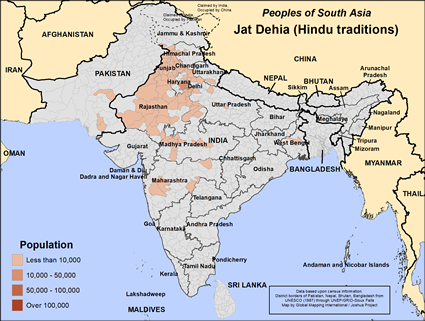Jat Dehia (Hindu traditions) in Pakistan

Send Joshua Project a photo
of this people group. |

Map Source:
People Group data: Omid. Map geography: UNESCO / GMI. Map Design: Joshua Project.
|
| People Name: | Jat Dehia (Hindu traditions) |
| Country: | Pakistan |
| 10/40 Window: | Yes |
| Population: | 2,800 |
| World Population: | 280,800 |
| Primary Language: | Sindhi |
| Primary Religion: | Hinduism |
| Christian Adherents: | 0.00 % |
| Evangelicals: | 0.00 % |
| Scripture: | Complete Bible |
| Ministry Resources: | Yes |
| Jesus Film: | Yes |
| Audio Recordings: | Yes |
| People Cluster: | South Asia Hindu - Jat |
| Affinity Bloc: | South Asian Peoples |
| Progress Level: |
|
Introduction / History
Dehia is a Jat gotra (clan or lineage) living in Pakistan. Most of this profile will describe them in the context of the greater Jat cluster.
We do not know for sure if the Jat people established themselves in the Indian desert. By the 4th century, they had spread to the Punjab region of South Asia.
Jats probably reached Egypt with the Muslim conquerors, lived in Afghanistan before the Muslims, and invaded China with the Mongol Army. They also proved to be a threat to Tamarlane in Persia and Uzbekistan in the 1400s. Jats rose to prominence following the 1669 Jat uprising against Mughal rule, and they ruled various princely states throughout the 18th century.
The Jat lifestyle fostered a martial spirit. Whenever they lost their kingdoms, Jat people retired to the countryside and became landed barons and the landlords with their swords girded round their waists. They would draw the sword out of the scabbard at the command of their panchayat (village leadership council) to fight invaders.
After 1858, under the British Raj, the Jats were known for their service in the Indian Army, being categorized as a "martial race" by the British, specifically in the Jat Regiment, the Punjab Regiment and the Sikh Regiment.
What Are Their Lives Like?
We still know Jats for their pride, bravery and readiness to sacrifice their lives in battle for their people and kin. Many in today's Pakistan chose a career in the military, though they are more likely to be agricultural landowners. A small percentage are traders and laborers.
At the village level, Dehia Jats appear to be democratic. They prefer elected village headmen and have little reverence for hereditary rights. They reserve leading positions for men.
Conservative by nature, the Dehia Jats rarely marry outside their community. From about 1650 AD onwards marrying within same gotra (ie, lineage or community) became more common. The modern-day litmus test Jat people use in marriage is if the girl and boy must not have the same great-great-grandparents (not related for four generations). If they are from the same gotra but are not directly related for four generations then it is considered acceptable for them to marry. Widow marriage is a social obligation. Jat women have inferior status to men. They must marry young, and few get the chance for an education.
The joint family system was popular amongst the Jats and large families used to share the same house and hearth. With the advancement of modern civilization, as people are becoming less dependent upon each other, the joint family system is going out of vogue.
In recent generations, many Jats have moved from agriculture to urban jobs in Pakistan. Though they traditionally didn't have high social status, Jats are gaining that today. They play a dominant role in Pakistan's public arena. There have been prominent Pakistani politicians with a Jat background. Today, the Jats are well read, and some occupy high positions in academic and technical arenas.
What Are Their Beliefs?
The Dehia people practice Hinduism, the ancient religion of India. Hinduism is a catch-all phrase for the local religions of South Asia, so it is very diverse. At the popular level, Hindus worship and serve the gods of the Hindu pantheon. They visit Hindu temples and offer prayers, food, flowers, and incense to their gods in hopes of gaining protection and benefits. They do not have a personal or familial relationship with their gods like Christians or Jews. There are other Hindus who are much more philosophical, especially among the Brahmins.
Almost all Hindus participate in yearly celebrations like Holi, the festival of colors and the start of spring / Diwali, the festival of lights / Navratri, the celebration of autumn / and Rama Navami, Rama's birthday.
What Are Their Needs?
Jat people need to put their hope and identity in the King of kings and Lord of lords.
Prayer Points
Pray for loving, anointed workers to go to the Dehia Jat people, and for their hearts to be ready to receive their Savior.
Pray for families of believers loving and serving others to grow reproducing churches.
Pray for a chain reaction of families reaching families that results in thousands of new believers who share their faith with others.
Pray for grace and truth expanding into their entire society as all believers learn to love others.